Aufgang, "Sonar" (Spitzer rmx)
I know you feel like things can’t get any worse than they did this week, but just remember that you felt the same way last week and look what happened. I have no words of wisdom or comfort with which you might better confront this reality. All there is now is music. Enjoy, for however briefly you are able.
New York City, August 16, 2017
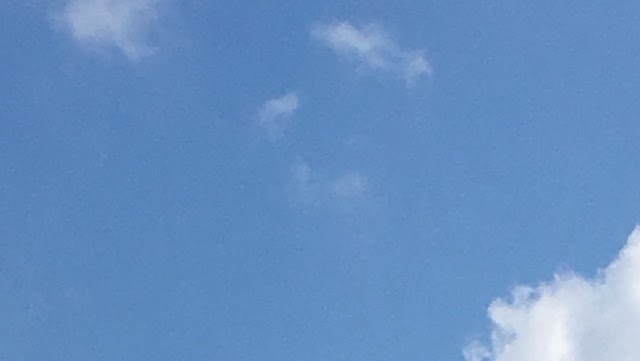 ★★★★ A woman in a bikini didn’t wait for the morning sun to reach the couches or lounges on her building’s roofdeck, but sat up in a straight chair on the side walkway where the rays were already shining. The light was clear and the air had dried. Thin clouds showed up to mitigate the sun at its height. People discussed the Greenmarket produce in German. The Hare Krishnas were setting up where the pamphleteer for the messianic Jews had been earlier. Something sounded like a disturbance but it was only a vendor hollering “Cold water one dollar” through the crowd at a crosswalk. People came up out of the subway shading their eyes. The late warm breeze stirred up the blood.
★★★★ A woman in a bikini didn’t wait for the morning sun to reach the couches or lounges on her building’s roofdeck, but sat up in a straight chair on the side walkway where the rays were already shining. The light was clear and the air had dried. Thin clouds showed up to mitigate the sun at its height. People discussed the Greenmarket produce in German. The Hare Krishnas were setting up where the pamphleteer for the messianic Jews had been earlier. Something sounded like a disturbance but it was only a vendor hollering “Cold water one dollar” through the crowd at a crosswalk. People came up out of the subway shading their eyes. The late warm breeze stirred up the blood.
You Are Where You Eat
To chronicle every way in which Donald Trump sucks eggs as compared to Barack Obama is not productive; it’s mostly just enraging. His inferiority is felt at home and abroad, in workplaces, in prisons and in schools and in courts and in churches and in dining rooms and in kitchens. His disdain for fine and interesting dining is part of his overall disinterest in the world beyond his shiny but empty gold-and-marble mind. Every meal Obama ate out made America great again. Every meal Trump eats anywhere gives the Statue of Liberty indigestion. He hasn’t just let Obama’s cultural momentum slow down. He’s slammed on the brakes, thrown it in reverse and squealed to the sunset in retrograde.
There’s no chance in hell Trump will be dining at Estela, folks.
On The Men Who Use Lydia Davis To Ruin Women
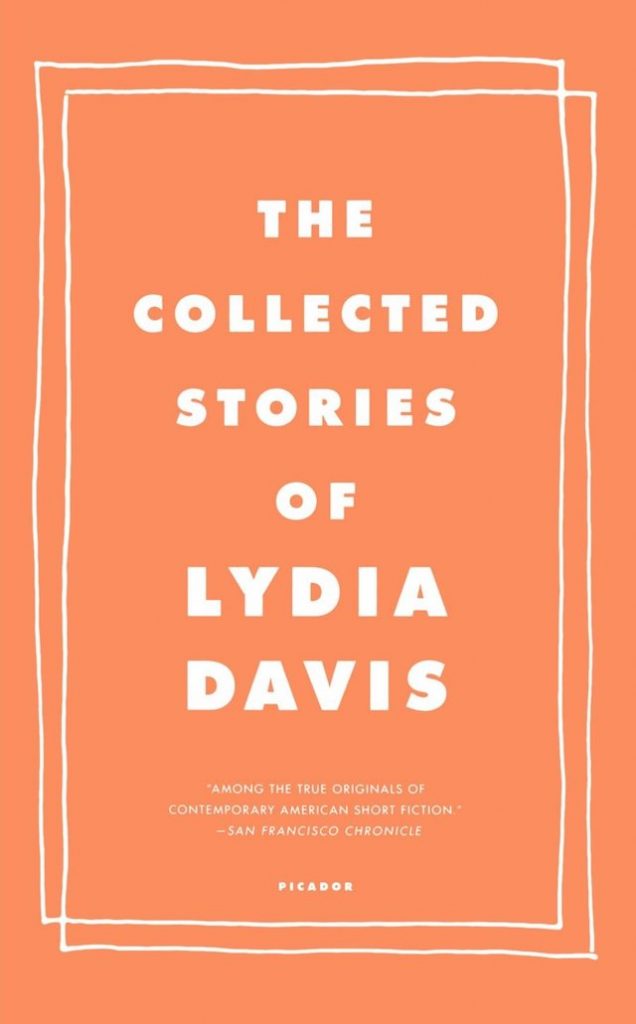
There are certain things we may know, already, about the men who recommend women read Infinite Jest, or suggest Žižek’s work — have you heard of him? — in earnest. A couple summers ago, I was at a bookstore in Boston when I saw a sign affixed to one of the fiction shelves: “Please Ask at the Desk for Works by Charles Bukowski, William Burroughs and Jack Kerouac.” I decided this must be a trap for that kind of man. I figured if someone ever did go to the desk, an alarm would sound, or a secret door might open up in the floor. Poof!
But what about the man who buys a woman The Collected Stories of Lydia Davis? I would like to know something about him.
It turns out there are at least a handful of men, just walking around the world, for whom this is the case. I met one of them a few years ago, when I started seeing a guy named Ben in the context of a summer fling that was mostly about books. Many authors had been involved, but the one who got top billing was Lydia Davis. He bought The Collected Stories of Lydia Davis as a gift for my birthday that summer, when we came across the book at our local Barnes and Noble. After things fizzled out (as these things often do), it was the only surviving relic of the whole romantic encounter, and therefore became a symbol. Of what, I didn’t know. Whenever I walked into a bookstore it was, inevitably, the first book that jumped out at me, mostly thanks to its bright coral-and-white coloring. For a while there, it was pretty crummy. But after enough time passed, it became just another book to me — one I loved! — though I still attached it to this person and our time together, and the fizzling out.
A Poem by Douglas Crase
The pays d’en haut Sublime
for Brian Walker
The fables were always upcountry but
The sublime
Understood in its practical sense as
This map of vista and refuge that slides into mind
Whenever you simply are looking
Has to be here: its precincts
So free of protection, freely desired,
And reached by that hard-driving warpath
Where each vote was personal, something you feel,
Cut time. The fashions
Are always downriver, not the sublime.
It lingers the unlicensed wealth
Due to any inhabitant, some,
Who could hurry its data into an ardent shape
As if life were a sensate
Cartography. So it would seem
In this land where the maps all lie flat
Until, trying one on,
You proceed via graphic new molt as your whole country
Walking—in whose indefensible habits
Let me come too, though the facts
Turn to fables themselves, strike back and run.
Douglas Crase has published of a book of poems, a biography, a commonplace book, and, most recently, a chapbook called The Astropastorals.
The Poetry Section is edited by Mark Bibbins.
Hiroshi Yoshimura, "Water Copy"
The only good news this week—this month? Of 2017?—is that Music For Nine Post Cards, the remarkable 1982 ambient album from Hiroshi Yoshimura, is being made available outside Japan come November. (This is a particularly welcome announcement for those music lovers whose only current copy is a poorly sourced rip from a YouTube clip, uh, if such people exist.) Anyway, look, you know what’s happening now, I don’t need to belabor it. Here are six minutes of serenity and beauty that will allow you to pretend that everything else isn’t going on, particularly if you shut off all your alerts and close whatever tabs you have open. That’s my recommendation, at least. Whatever you do, please enjoy.
New York City, August 15, 2017
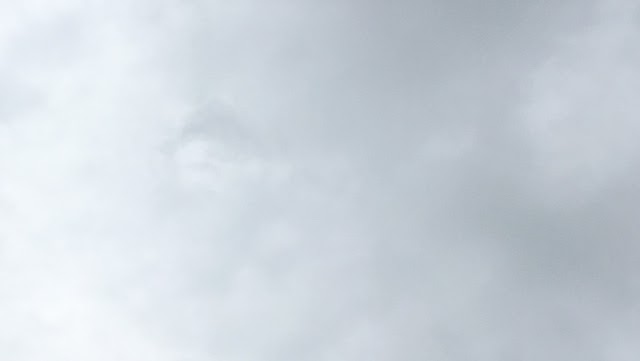 ★★ What the morning lacked in brightness it made up for by the intensity of the smells on the damp air. A light but increasing rain fell on the short, straight-line walk to get lunch, a rain unimportant enough for umbrellas to be effective against it. There was no going out afterward; the rain got heavier and the day darker. By rush hour it had stopped, save for a few drops leaking from the still-heavy clouds. Then the round shape of the sun, like an egg yolk, popped suddenly out from the now-revealed edge of the clouds. It finished its descent through an ever-growing, incongruously ordinary stretch of clear blue.
★★ What the morning lacked in brightness it made up for by the intensity of the smells on the damp air. A light but increasing rain fell on the short, straight-line walk to get lunch, a rain unimportant enough for umbrellas to be effective against it. There was no going out afterward; the rain got heavier and the day darker. By rush hour it had stopped, save for a few drops leaking from the still-heavy clouds. Then the round shape of the sun, like an egg yolk, popped suddenly out from the now-revealed edge of the clouds. It finished its descent through an ever-growing, incongruously ordinary stretch of clear blue.
Ninety-Eight Years of Fallen Women
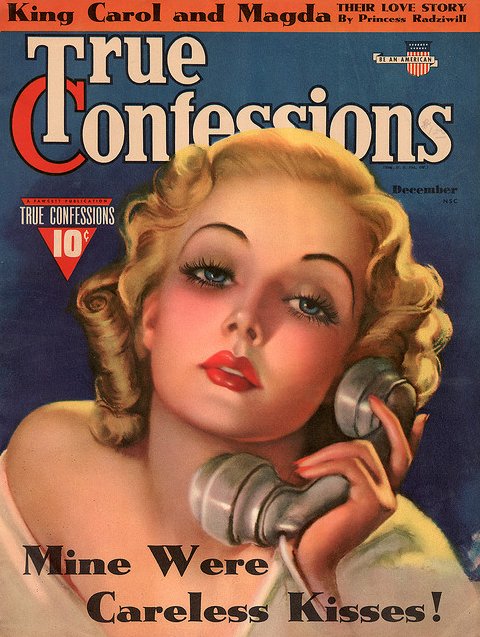
“For what am I to myself without You, but a guide to my own downfall?” —St. Augustine, Confessions
If you’ve been to the Union Square Barnes and Noble, there’s a decent chance you’ve seen True Story or True Confessions before—they’re on the magazine rack in the literature section, next to the Starbucks. The cover model is always a smiling, seasonally appropriate white woman, and the copy is generally funny in the style of a de-fanged Reductress headline. “YAM WARS,” read the November 2016 Thanksgiving issue of True Story. “So Many Dads…But Do Any Love Me?” read the June 2016 Father’s Day issue of True Confessions.
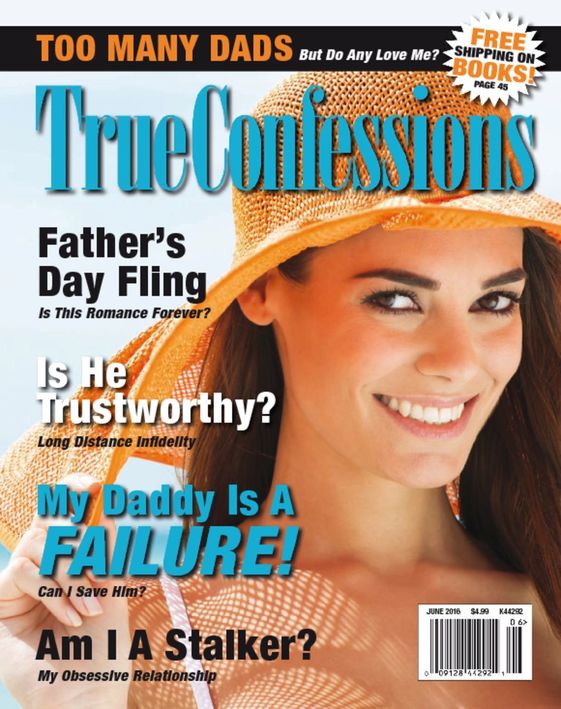
The magazines are staple-bound and always 64 pages long—ten stories, two “Inspirational Mini-Stories, and one recipe, released once a month. The paper inside is newsprint, the photos all stock images, and the prose leans toward Kindle single. They’re not exactly the kind of magazines that anyone would describe as “venerable” at a glance, but the goofy covers belie the publications’ age and legacy. The first women’s confessional magazines, True Story and True Confessions are now approaching their centennial.
Founded in May of 1919 by publisher, Bernarr MacFadden, True Story was actually his wife’s idea. “Broken-hearted women sent [MacFadden’s Physical Culture magazine] letters after they had done two hundred knee bends, twice a day, and thrown away their corsets, only to find that the Greek gods wouldn’t give them a tumble,” Mary MacFadden wrote in her memoir of their life together, Dumbbells and Carrot Sticks. “These are true stories…Let’s get out a magazine to be called True Story, written by its readers in the first person….The idea has a correlative force. I studied correlativity in school…It’s the kind of thing that helped make the British Empire.”
She was right. Born Bernard McFadden in Mill Spring, Missouri in 1868, her husband was a small, sickly child until he was orphaned at the age of eleven and sent to work on a farm. He spent the rest of his life obsessed with strength and fitness, becoming a personal trainer and going so far as to change his name to Bernarr MacFadden because he believed the alternate spelling suggested a certain leonine masculinity. In 1913, he sponsored a search for “Great Britain’s Perfect Woman,” in a less-than-subtle attempt to find (a third) wife and Mary, a millworker and champion swimmer 25 years his junior, won. According to her memoir, he proposed in the middle of a jog.
At the time, Bernarr was already presiding over a somewhat dubious fitness empire (he was, among other things, an evangelical anti-vaxxer and the founder of The Coney Island Polar Bear Club) but it was True Story that made him a millionaire. The first issue featured a man and a woman glaring at each other, “And Their Love Turned to Hatred!” printed across the cover. The monthly magazine was an immediate hit and a pioneer promotionally—targeting the heretofore untapped market of working-class women or, as the Saturday Evening Post dismissed them, “MacFadden’s anonymous amateur illiterates.”
What Is A Normal Thing To Say During The Solar Eclipse?
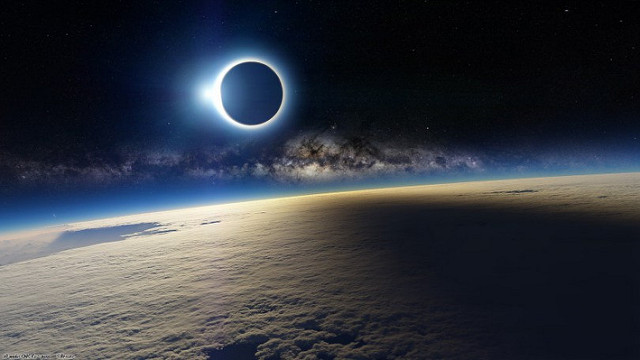
Did you know there’s going to be a solar eclipse on Monday? Very cool. I am lucky enough to live in a state in which it’s possible to drive a couple of hours and see the total solar eclipse, which maybe you are planning to do, too. The bad news for me, and most people, in my opinion, is that it is on a Monday which is a day many people go to work.
First things first: obviously I would love to not go to work. Not going to work rules. But I will just be coming off of a week vacation (I’m writing this from the Awl office in New York where I have screamed “I’m walkin’ here” any time a car horn goes off outside), and a quick glance at my work email already sent me into hives once on this trip, so it is not feasible for me to travel to see the eclipse, nor “make a whole production of it.” I have put this in quotes not to be judgmental but because some people are nuts. So I guess what will happen is that I will go to my job, do my job, and then at some point a solar eclipse happens, and then I keep doing my job, and then I go home for the night. Maybe buy some groceries.
What is the social etiquette of being at work during a solar eclipse? This is what I really want to know and feel both curious and stressed about. Should I schedule meetings around the moon blocking out the sun? Should I get up, mid-meeting, and say, “excuse me, but it’s space”? Should I walk over to a window and take a quick glance at the partial darkness and say, “hm, seems like night, but it’s afternoon”? I have no idea. As they say online, “this is not normal.”
(I could just say nothing but I refuse!!!)
All of this is to say that I have no idea what to say because while I am not eclipse-averse but I do think, generally, space is terrifying and I would have been some kind of cave-person who thought the world was for sure ending. But you can’t say stuff like that now, because someone will launch into a conversation with you about orbits. And it would be unfair, I think, to lock myself in the bathroom like those awful kids do that that little girl in the world’s saddest Ray Bradbury short story. So I am going to look at the somewhat blotted out sun, and to my best prediction say something like, “hell yeah,” or “for sure,” and then go back to doing my job.
Image: Michail Kirkov via Flickr

